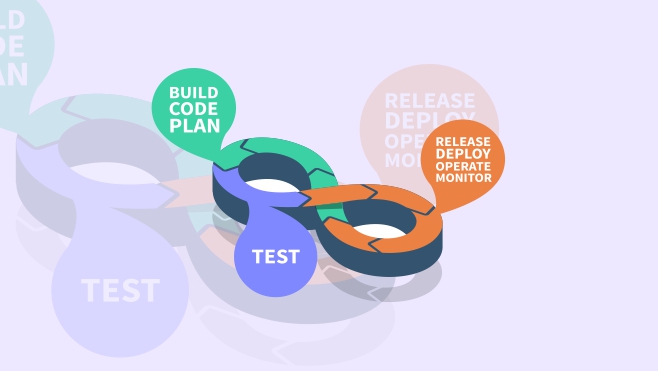DevOps Training in Hyderabad

Online Training | Classroom | Virtual Classes
- DevOps Training in Hyderabad with 100% placement assistance
- 1860 testers placed in 600 companies in last 8 years
- Real time expert trainers
- Indutry oriented training with corporate casestudies
- Free Aptitude classes & Mock interviews
About DevOps Training in Hyderabad
DevOps is a combination of software development and IT operations. The DevOps training program of MindQ aims at providing knowledge on the concepts of all the DevOps tools that include Git, Ansible, Jenkins, Puppet, Kubernetes, Nagios and Kubernetes with extensive training methods. The DevOps course is fitting for both beginners and professionals and works on enhancing their skills and experience in DevOps. MindQ offers the best DevOps training in Hyderabad with qualified and certified trainers with experience ranging for years. The course is customized in a way that meets the standards of the industry with detailed and updated training techniques. We follow and implement project based learning to help develop practical knowledge in our students. By the end of the course, you will get thorough knowledge on continuous integration, virtualization, configuration management that are various aspects of software development and operations along with a DevOps course completion certificate. We also provide placement assistance to our students that is completely optional.
DevOps Training in Hyderabad Curriculum
•What is DevOps
•Dev and Ops activities
•Scope of DevOps
•Tools to achieve DevOps process
•Roles and Responsibilities of DevOps engineer
Overview about
•IAAS
•PAAS
•SAAS
DevOps on cloud computing and virtualization
Containership tool in DevOps model
Career on DevOps
GIT
- Introduction about version control system?
- Difference between Central & Distributed Version control
- Git software download and installation with configuration.
- Git Architecture
- Git change flow with
- About bitbucket &
- Repository creation on GitHub and bitbucket and play on
- Exercise: Performing a local Git workflow
- Exercise: Working with a (local) remote repository
- Git Branching Strategy, Gittags, git diff
- Comparing changes
- Stashing changes on Git
- Resetting changes with git reset
- Deleting changes in the working tree and staging area for tracked files
- Retrieving files from the history
- Revert commits
- Merging&Rebasing branches and Solving merge conflicts
- Editing history with the interactive rebase
- Using the Git cherry-pick command
- Define alias
- Migrating from SVN
ANT
- Introduction about Build process & build
- Installing & configuration about Ant
- Ant concepts and terminologies
- Working with Ant
- Ant Tasks
- Automating your build and testing through Ant tasks
- Using Ant for automated deployment
- Creating Custom Ant tasks
Maven
- Introduction to Apache Maven
- Installing and Running Apache Maven
- Getting Started With Maven
- Terminology & POM structure
- Creating Archetypes (Standard java project, web project, multi module project)
- Commonly Used Plugins
- Writing Plugins (Maven)
- Repository Management
- Release Management
- Maven integration with eclipse or other IDE’s
- Sonarqube integration with
- Nexus &Artifactory integration with
- Deployment on
SonarQube
- Introduction on Code Analysis & Code coverage & code Review
- Download & installation & configuration about sonarqube
- Quality gates & threshold values
- About code rule
- Customize & creating new code rule
- Integratin sonar with maven & Jenkins.
SonaTypeNexus &Jfrog Artifactory
- What is Binary repository & why it is required.
- Download & install & configure Nexus &artifactory tools.
- How to configure snapshot & release
- How to create customize
- Nexus &artifactory repositories Integration with maven &
Linux
- Introduction of Unix
- Installation
- Boot Procedure and kernel parameters
- file systems hierarchy
- Basic commands
- Software management
- User and Group administration
- Managing file systems and partitions
- SELINUX (BASICS)
- Network Configuration and Troubleshooting
- Firewalls
- Webserver
Shell Script
- Introduction of UNIX Shell
- Shell input & output
- Variables
- Operators
- Conditional Code
- Loops
- Text processing
Jenkins
- Introduction about CI/CD/CD (Continuous Integration Continuous Deployment / Continuous Delivery)
- History of Jenkins
- Download & installing & configuring Jenkins various methods.
- Setup Security
- Email and Version Control
- Master/slave configurations
- Creating & configuring & run a Jenkins job
- Running job manually and automated with schedule & poll
- All configurations & features under MANAGE JENKINS
- Monitoring External jobs
- Creating build & deploy pipelines
- Jenkins pipeline as a
- Master & slave
AWS (Amazon Web Services)
- Introduction to Cloud Computing
- AWS Management Console
- AWS Architecture
- Setting up of the AWS Account
- Amazon EC2 and Amazon EBS
- AWS Storage Services: S3
- Amazon Cloud Watch
- ELB
- AutoScaling
- IAM
- RDS
- Dynamo DB
- AWS Cloud Front
- Cloud Formation
- SNS
- VPC
- Route53
Docker
- Introduction about traditional server architecture & Virtual
- Introduction to Docker and its architecture with underlying
- About docker
- Docker download & installation &
- About images, containers and play around on
- Docker machine.
- Docker volumes
- Docker networking
- Docker port binding
- Docker file/build.
- Docker composes
- Docker swarm
- Dockerizingthe applications
Kubernates
- Downloading & installing kubernates
- Creating kubernates jobs, pods, deployments and services.
- Storage: volumes and persistent storage
- Load balancing & input
Ansible
- Introduction about configuration management & infrastructure management
- Introduction to ansible
- Downloading & installation & configuration
- About inventory with host &
- About ansible playbooks
- Dynamic inventory on aws& creating new server instance.
- Configuring web-servers
- Application deployment with ansible
- About ansible roles &provisioners.
- About ansible
ELK
- introduction to ELK
- Installation and Configuration of File beat
- installation and Configuration of Elastic Search
- installation and configuration of kibana
- Analyzing and Troubleshooting
Nagios
- Introduction to Nagios
- Configuring Nagios Server
- Adding Remote Hosts
- Analyzing and Troubleshooting
Learn with Mind Q, Kick start your corporate career.
DevOps Training in Hyderabad Highlights
- 100% placement assistance
- Free demo
- Hands On practical knowledge
- Classroom + online + weekend training
- 24*7 support team.
- DevOps course completion certificate
- Mock interviews
- Resume preparation assistance
DevOps Training in Hyderabad Certificate
We provide a DevOps course completion certificate that is absolutely free and optional. The certificate can be printed out like a hard copy or given digitally according to your requirement. You can link it to your professional LinkedIn accounts which can be listed in your resume.

Who should Learn this DevOps Training?
The course is beneficial for those professionals
Software Tester
System Admin
Application Developers
Solution Architect
Security Engineer
Integration Specialist
These are prerequisites for learning this course
*It is better to have knowledge on any scripting language.
*Fundamentals of Linux
Who Should Take the DevOps Course?
- Software Tester
- System Admin
- Application Developers
- Solution Architect
- Security Engineer
- Integration Specialist
Skills you will gain from our DevOps course
- Understand Devops, its tools and responsibilities.
- Using GIT to manage different source codes.
- Build applications using Jenkins, maven etc.
- Integration of the CI/CD Pipeline
- Build and Deploy containers using Docker
- Knowledge in AWS
- Installation and configuration of Docker
- Installation and configuration of kubernetes.
- Downloading, Installation and configuration Ansible.
Career opportunities after taking the course
- DevOps Architect
- DevOps engineer
- DevOps consultant
- DevOps Lead
- AWS DevOps consultant
- Associate DevOps engineer
- DevOps Automation Engineer
DevOps Training in Hyderabad FAQ
What are the prerequisites for the DevOps course?
You can choose from our three modes of training i.e.., Online, Classroom and Weekend training programs.
What about the Qualification of the trainer?
All the trainers at MindQ are certified and have experience in respective technologies.
What if I miss a class?
You can attend our next live batch or we can also provide backup classes for you.
Can we get DevOps Training in Hyderabad based on my availability?
Yes, you can choose from our three modes of training – Online, Classroom and Weekend training programs according to your availability.
Do you provide placements for students after completion of DevOps Training in Hyderabad?
We will provide complete assistance to get you placed in the top companies and by providing in-depth training with real-time examples that will help in gaining expertise.
What about DevOps Training certification?
Yes, we at MindQ provide certification on completion of the Devops Training in Hyderabad course
Will there be any real-time projects at MindQ?
We will provide real time projects and assist you in the completion of the projects.
DevOps Training in Hyderabad Features
We offer a wide range of high quality of teaching and extra-curricular activities.

Instructor-Led Training Sessions

Expert Trainers

Flexible Schedule



